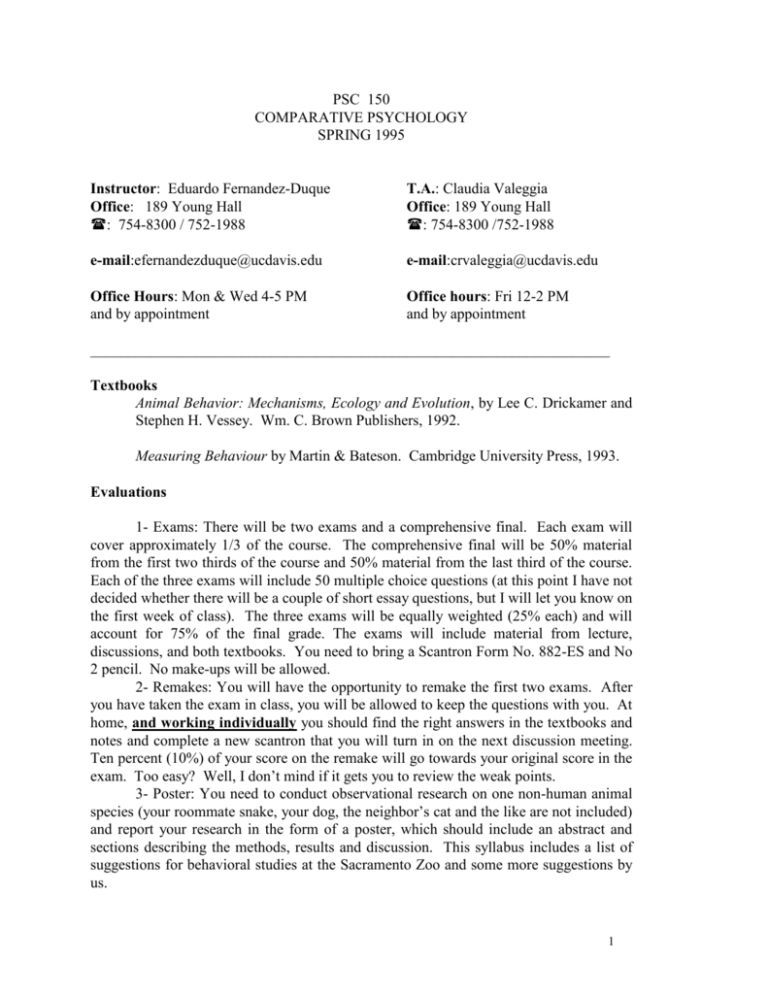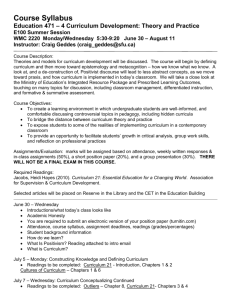PSC 108
advertisement

PSC 150 COMPARATIVE PSYCHOLOGY SPRING 1995 Instructor: Eduardo Fernandez-Duque Office: 189 Young Hall : 754-8300 / 752-1988 T.A.: Claudia Valeggia Office: 189 Young Hall : 754-8300 /752-1988 e-mail:efernandezduque@ucdavis.edu e-mail:crvaleggia@ucdavis.edu Office Hours: Mon & Wed 4-5 PM and by appointment Office hours: Fri 12-2 PM and by appointment _____________________________________________________________________ Textbooks Animal Behavior: Mechanisms, Ecology and Evolution, by Lee C. Drickamer and Stephen H. Vessey. Wm. C. Brown Publishers, 1992. Measuring Behaviour by Martin & Bateson. Cambridge University Press, 1993. Evaluations 1- Exams: There will be two exams and a comprehensive final. Each exam will cover approximately 1/3 of the course. The comprehensive final will be 50% material from the first two thirds of the course and 50% material from the last third of the course. Each of the three exams will include 50 multiple choice questions (at this point I have not decided whether there will be a couple of short essay questions, but I will let you know on the first week of class). The three exams will be equally weighted (25% each) and will account for 75% of the final grade. The exams will include material from lecture, discussions, and both textbooks. You need to bring a Scantron Form No. 882-ES and No 2 pencil. No make-ups will be allowed. 2- Remakes: You will have the opportunity to remake the first two exams. After you have taken the exam in class, you will be allowed to keep the questions with you. At home, and working individually you should find the right answers in the textbooks and notes and complete a new scantron that you will turn in on the next discussion meeting. Ten percent (10%) of your score on the remake will go towards your original score in the exam. Too easy? Well, I don’t mind if it gets you to review the weak points. 3- Poster: You need to conduct observational research on one non-human animal species (your roommate snake, your dog, the neighbor’s cat and the like are not included) and report your research in the form of a poster, which should include an abstract and sections describing the methods, results and discussion. This syllabus includes a list of suggestions for behavioral studies at the Sacramento Zoo and some more suggestions by us. 1 The poster session will be held in the MUII room on Saturday June 3. Half of the class will present their posters from 9 to 12 in the morning (the other half of the class will look at the posters) and from 2 to 5 in the afternoon you will switch roles. You are required both to present your poster (e.g. in the morning) and participate as “observer” (e.g. in the afternoon) to satisfy this requirement. The poster will account for 25% of the final grade. On a weekend?!! Yes, if you trust us, we hope you’ll find the poster session one of the best learning experiences you have ever had. Claudia (your T.A.) and myself are very excited about the idea and we hope you will share our excitemen. Since most of you probably have never prepared a poster before, Claudia will spend most of the first discussion meeting getting you started and most of the other meetings will also be used to help you with the project. You will have to meet with Claudia or myself twice during the quarter to discuss your project. When the time comes (see syllabus below), you will be asked to sign-up for 20’ appointments with us. Meeting with each of you (100 students) will be a lot of work, but we are convinced that you will find it very useful. We need your cooperation signing-up and being punctual for your appointment!!! There will be 80 people waiting! For those of you that cannot participate in the poster session on that week-end, you will have to present your research in the form of a double-spaced 15-page term paper (5 references minimum, textbooks and lectures excluded) which is due on Friday, June 2 in class. The poster session has been funded by the Teaching Resources Center. _____________________________________________________________________ SYLLABUS Lecture 1 (Monday, April 3) Introduction to the course. Goals and objectives. History of Animal Behavior. Why study Animal Behavior? Why Animal Behavior in a Psychology class? Animal Behavior at UCDavis. Proximate vs Ultimate explanations of behavior. Readings: Ch 1 & 2 in Drickamer & Vessey (abbreviated D&V) Lecture 2 (Wednesday, April 5) Foundations of Animal Behavior studies: Comparative Method, Natural Selection, Genetic Studies. Traditional approaches to the study of Animal Behavior: Comparative Psychology, Ethology, Behavioral Ecology, Sociobiology. Readings: Ch 2 & 3 in D&V, also pages 177-181, 401-402, 416-417 Discussion 1 (Friday, April 7) Description of term project: What is a poster paper? Poster session on June 3-4. Where to go. Using Martin & Bateson’s textbook. Readings: Ch 1 & 2 in Martin & Bateson, (abbreviated M&B) 2 Lecture 3 (Monday, April 10) Behavior Genetics. Nature-nurture debate, interaction and epigenesis. What is behavior genetics? Two levels of analysis: individual vs population. Experiments on inbreeding, artificial selection, cross-fostering, twins. Pleiotropy, polygeny. Readings: Ch 4 & 5, pages 177-181 of Ch 9 in D&V Lecture 4 (Wednesday, April 12) The nervous system and behavior. Neuroethology. Review of nervous system anatomy (from textbook). Evolution of the nervous system (from textbook). “It’s a different world out there”, concept of “umwelt”. Sensation and perception. A survey of animal senses and their neural substrates: Production of cricket song, electric communication in fish, infrared communication in snakes, echolocation in bats and predator avoidance in moths. Readings: Ch 6 in D&V Discussion 2 (Friday, April 14) Sign-up for 20’ appointments between Monday-Friday next week (April 17-21) Research design: problems and solutions. What to observe: choosing and defining the right behavioral categories. Readings: Ch 3 & 4 in M&B Lecture 5 (Monday, April 17) Hormones and behavior. Communication within the body. The endocrine system. Activational and organizational effects of hormones. Interaction between hormones and behavior: a two-way dialog. Social contraception in mammals. Aggression in birds. Invited Speaker: Claudia Valeggia (Animal Behavior Graduate Group, UCDavis) Readings: Ch 7 & 8 in D&V Lecture 6 (Wednesday, April 19) Development of behavior. When does development of behavior begin? Two approaches: adult-focused vs age-specific. Imprinting. Juvenile events: development of song learning in sparrows, play behavior in carnivores. Epigenesis, developmental homeostasis. Readings: Ch 9 & 10 in D&V Discussion 3 (Friday, April 21) Measuring animal behavior. Exercise in measures of behavior. Introduction to sampling and recording methods. Readings: Ch 5 and 6 in M&B 3 Lecture 7 (Monday, April 24) MIDTERM I April 24 Recording animal behavior exercise. Lecture 8 (Wednesday, April 26) Habitat selection. Home range, territory, dispersal, dispersion, philopatry, immigration, emigration. Costs and benefits of dispersal. Dispersal in mammals and birds. Territory acquisition and territory function in lizards. Readings: Ch 10 & 16 in D&V Discussion 4 (Friday, April 28) Turn in completed Scantron form 882-SE for Midterm I remake. Sampling and recording methods. Exercise. Readings: Ch 6 & 8 in M&B Lecture 9 (Monday, May 1) Feeding relationships. Optimal foraging. Finding food, selecting what to eat, capturing prey. Trade-off between foraging and danger of predation. Defense against predators: individual vs group strategies. Readings: Ch 12 & 17 in D&V Lecture 10 (Wednesday, May 3) Migration, Orientation and Navigation. Invited Speaker: Dr. Hugh Dingle (President Animal Behavior Society, Dept. Entomology, UCDavis) Readings: Ch 15 in D&V Discussion 5 (Friday, May 5) I got the data, now what? Interpretation and analysis of observations. Readings: Ch 9 in M&B Lecture 11 (Monday, May 8) Communication. What is communication? Channels of communication. Functions of communication. Mate-attraction signals of Tungara frogs, honeybee dances. Costs and benefits of signaling. Readings: Ch 11 in D&V Lecture 12 (Wednesday, May 10) Invited Speaker: Dr. Don Owings (Dept. Psychology, UCDavis) “Animal Communication” 4 Biological timekeeping Readings: Ch 8 & 11 in D&V Discussion 6 (Friday, May 12) How to present your work to the scientific community: posters and papers. Lecture 13 (Monday, May 15) Sexual reproduction. Why sex? Advantages of sexual reproduction. If sex, why two sexes (not three or four)? Why are the sexes so different both morphologically and behaviorally? Sexual selection: intra and intersexual selection. Readings: Ch 13 &14 in D&V Lecture 14 (Wednesday, May 17) MIDTERM II May 17 Discussion 7 (Friday, May 19) Turn in completed Scantron form 882-ES for Midterm II remake. Sign-up for 20’ appointments between Monday-Friday next week Question & answer session. Polishing up your final draft. Lecture 15 (Monday, May 22) Mating systems and Parental care. Taxonomy of mating systems: monogamy, polyandry, polygyny. Alternative reproductive strategies. Parental investment, parent-offspring conflict. Readings: Ch 13 & 14 in D&V Lecture 16 (Wednesday, May 24) Evolution of behavior patterns. Phylogenies, adaptations, speciation. Invited Speaker: Dr. Kyle Summers (Dept. Wildlife & Fisheries): “Phylogenies and Animal Behavior” Readings: Ch 19 in D&V Discussion 8 (Friday, May 26) Question & answer session. Lecture 17 (Monday, May 29) Holiday, Memorial Day. Class meets on Sunday morning !! :) Lecture 18 (Wednesday, May 31) Invited Speaker: Dr. Lynette Hart (Center for Animal Alternatives, School of Veterinary Medicine, UCDavis): “Animal use in research, teaching, and testing: Hot Topics” 5 Evolution of Social Systems. Kin selection, altruism, inclusive fitness. Costs and benefits of living in groups. Reciprocal altruism, helpers at the nest. Eusociality Readings: Ch 20 & 18 (only pages 375-377) in D&V Discussion 9 (Friday, June 2) TERM PAPER DUE IN CLASS Getting ready for poster presentation. Claudia will be available for consultation. June 3, 9-6 PM Poster session, MUII Lecture 19 (Monday, June 5) Conservation Biology and Animal Behavior. Evaluations of the course. Readings: Ch 18 in D&V Lecture 20 (Wednesday, June 7) Eduardo and Claudia attending the Society for Conservation Biology Meetings. No lecture today. Discussion 10 (Friday, June 9) No discussion today. Monday, June 12 Office hours: 8-12 (Eduardo), 1-5 (Claudia) FINAL, JUNE 13, 1:30-3:30 HAVE A GREAT SUMMER!!! 6







